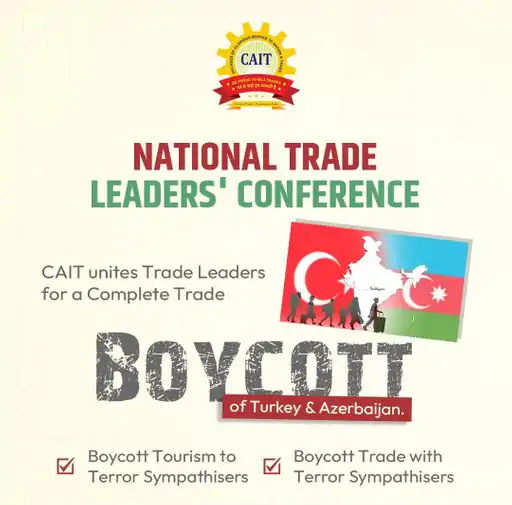Indian Associations Call For Tourism And Trade Boycott Of Turkey And Azerbaijan

New Delhi: Indian travel and trade associations have initiated an economic boycott of Turkey and Azerbaijan in response to their support for Pakistan. The development comes amid India’s sharp reaction to Turkish-supplied drones allegedly used in attacks along its western and northern borders.
According to the Travel Agents Association of India and the All India Spice Import Federation, this boycott includes a complete halt in tourist promotion and a suspension of major imports and exports with both countries. Travel data indicates a dramatic 60% drop in new bookings to Turkey and Azerbaijan, once favored summer destinations for Indian tourists. Popular alternatives such as Singapore, Bali, Malaysia, and Vietnam have seen a surge in preference.

Gopal Unadhkat, President of the Rajkot Travel Agents Association, confirmed that nearly all bookings to these nations have been cancelled, with no new ones being accepted. Previously, hundreds of tourists from Gujarat alone traveled to Istanbul and Baku each season. That traffic has now dried up completely, he said.
The boycott is already having ripple effects. India has suspended the export of spices, especially red chilies, to Turkey, while also halting the import of Turkish dry fruits. Instead, Indian buyers are now turning to suppliers in the U.S. and Afghanistan.
In a related move, the Bureau of Civil Aviation Security revoked clearances for Celebi Airport Services India—a ground-handling company operated by Turkey’s Celebi Group. The firm was managing ground operations at nine Indian airports, including major hubs like Delhi and Mumbai, where it held a significant market share.
India and Turkey previously shared a trade volume of $11 billion, with India exporting $6.65 billion worth of goods annually. These exports included engineering goods, pharmaceuticals, textiles, and chemicals. Imports from Turkey, valued at $3.78 billion, comprised petroleum products, machinery, edible oils, and dry fruits.
According to Hiren Gandhi of the Global Business Foundation, Indian firms have invested roughly $125 million in Turkey, while Turkish investments in India total around $300 million. The recent boycott, if sustained, could impact both economies, but especially Turkey’s, which has long benefited from Indian tourism and trade.
India’s message is clear: economic leverage will now be a key tool in shaping foreign relations—especially with countries seen aligning with its adversaries.




